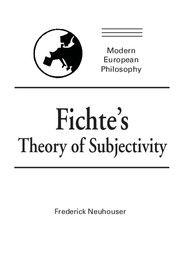Book contents
- Frontmatter
- Contents
- Acknowledgments
- Abbreviations
- Introduction
- 1 Origins of Fichte's theory: the notion of the unity of reason
- 2 The development of Fichte's project from 1793 to 1799
- 3 The self-positing subject and theoretical self-consciousness
- 4 The self-positing subject and practical self-determination
- Conclusion
- Bibliography
- Index
Conclusion
Published online by Cambridge University Press: 05 June 2012
- Frontmatter
- Contents
- Acknowledgments
- Abbreviations
- Introduction
- 1 Origins of Fichte's theory: the notion of the unity of reason
- 2 The development of Fichte's project from 1793 to 1799
- 3 The self-positing subject and theoretical self-consciousness
- 4 The self-positing subject and practical self-determination
- Conclusion
- Bibliography
- Index
Summary
In the preceding four chapters we have tried to understand Fichte's theory of subjectivity as one version of the general project of demonstrating the unity of theoretical and practical reason. After a survey of his early philosophical development, we arrived at the conclusion that by 1797 Fichte had come to regard his first principle of philosophy, as it is formulated in the thesis of the self-positing subject, as an attempt to grasp the essence of subjectivity in all of its configurations, or, what is the same, to articulate the single fundamental structure, or “activity,” that underlies and informs all of consciousness. If this thesis is correct, then it must be possible to show that subjectivity in both its practical and theoretical forms depends upon an activity of the subject that has the structure of what Fichte calls “self-positing” activity. Our analysis of the notion of self-positing began in Chapter 3 with an examination of the issue in connection with which Fichte initially constructed his theory of subjectivity, namely, the phenomenon of theoretical self consciousness. We saw there that Fichte's account of the subject as a self-positing activity, or Tathandlung, could be understood as a development of Kant's own view of the theoretical subject, especially with respect to two issues: the distinctive nature of the subject's self-awareness in theoretical self-consciousness and the absolute, or self-constituting, nature of the representing subject.
- Type
- Chapter
- Information
- Fichte's Theory of Subjectivity , pp. 167 - 171Publisher: Cambridge University PressPrint publication year: 1990

